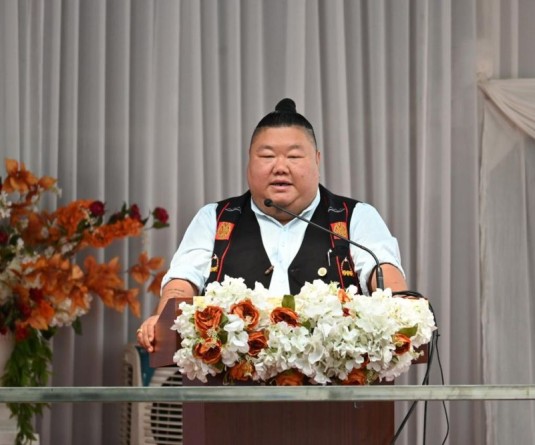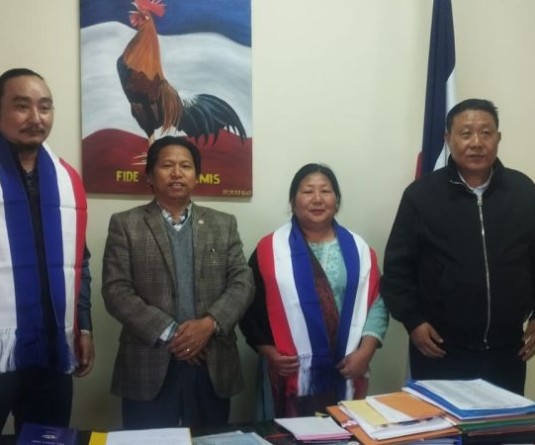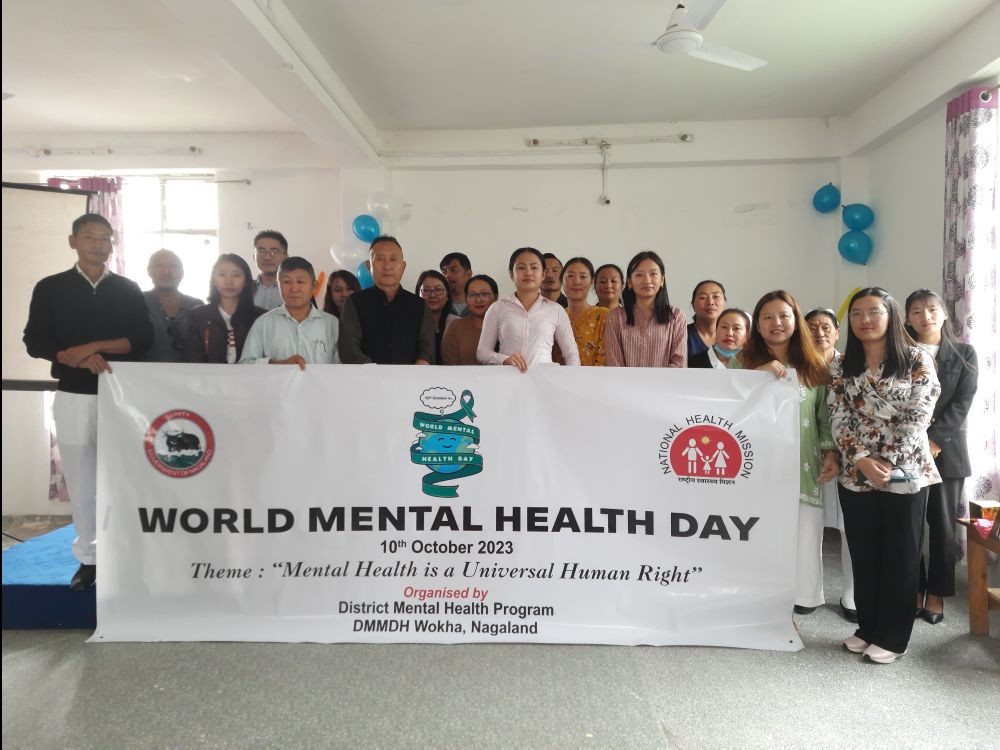
World Mental Health Day observed ‘to improve knowledge, raise awareness and drive actions’
Dimapur, October 10 (MExN): The World Mental Health Day was observed with the theme ‘mental health is a universal human right’ in different part of Nagaland on October 10. Through the medium of talks and other activities, the respective District Mental Health Programme along with stakeholders observed the day “to improve knowledge, raise awareness and drive actions on mental health as a universal human right.”
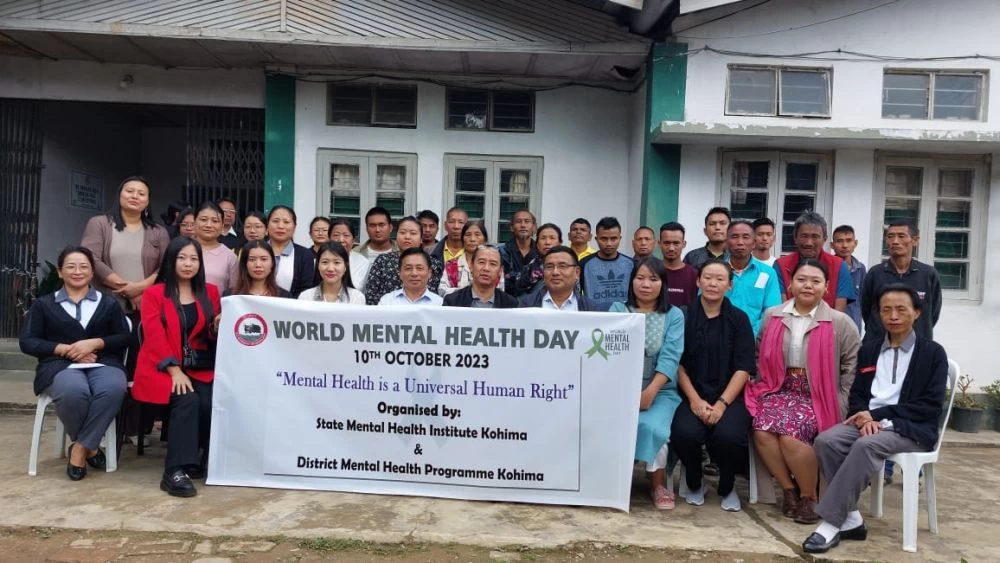
KOHIMA: State Mental Health Institute Kohima (SMHIK) observed world mental health day at SMHIK with Dr Nuvotso Khesoh, Senior Medical Officer (SMO), SMHIK as the resource person.
“Mental health is a basic human right for all people adding that every human being is born with inherent dignity and worth. Everyone, who ever and wherever they are, has a right to the highest attainable standard of mental health, which includes the right to be protected from mental health risks-stressful life events, social isolation, discrimination and racism, unemployment,” Dr Khesoh asserted.
He said that everyone is endowed with right to available, accessible, acceptable and good quality care and right to liberty, independence and inclusion to the community. Highlighting that human right and mental health are closely related or interrelated, he made an observation that person with mental illness, are at the high risk of human right violations- the property can be taken or sold, thrown out from the family, abuse etc.
“At the same time if a normal person, if his/her human rights are violated by arrest and abuse for no reason, they are high risk of developing mental illness,” he added.
Many people will not know what it is like to experience mental health illness or to have a family member with a mental illness. In this regard, he stressed on need for inclusive environment for the wellbeing of all members of society without discrimination, harmful stereotypes and stigma in community, family, schools and workplace prevent healthy relationships and social interactions.
The officer stated that the mental health burden in the country is very huge and stated that the treatment gap for mental disorder ranges between 70-80% (the person who have been diagnosed and they are not on treatment).
Dr Khesoh asserted that promoting mental health as a universal human right involves creating an environment that supports psychological well-being, reduce stigma, and ensure access to mental health resources. In this regard, he suggested ways to advance mental health as a fundamental human rights: that education and awareness about mental health reduce stigma and foster understanding while it ensure access to education about mental health in schools and universities to promote understanding, reduce stigma and coping strategies
He viewed that accessible mental health services with affordable and quality mental health is the way out. The expert said workplace mental health program which encourage employers to establish and promote workplace mental health programs, including stress reduction initiatives and employees assistance programs will help, besides he also underscored the need for Community support networks to foster and provides emotional support resources for individuals experience mental health challenges.
Meanwhile, he stressed on the need for early intervention program to develop and implement early intervention program to identify and address mental health issues at an early stage.
Dr Khesoh pointed out the need to promote holistic wellbeing:-emphasis holistic wellbeing address not only mental health, but also physical, social connection and a sense of purpose (spiritual).
He highlighted the importance of inclusive policies to advocate for policies that promote inclusivity, diversity and equality, contributing to a supportive environment for mental health and to combat stigma with launching of anti-stigma campaign to challenge negative perception and stereotypes surrounding mental health conditions.
He opined that integration of mental health into primary care setting to ensure a comprehensive approach to overall health will help while he stated that establishing crisis intervention hotline and services to provide immediate support to those in need will boost the way out for mental health.
Dr Khesoh also stressed on the need for encouraging responsible media reporting on mental health issues to avoid perpetuating stereotypes and misinformation.
“Promoting mental health as a universal human right requires a multifaceted approach that individuals, communities, policymakers and health care professionals working together to create a society that values and prioritize mental wellbeing,” he said while calling for collective efforts to this end.
Dr Khriesilie Sachu, Medical Superintendent, of SMHIK underlined the definition of health and stated that the day is commemorated to spread awareness about mental health. Short speeches were delivered by patient and patient’s relatives.
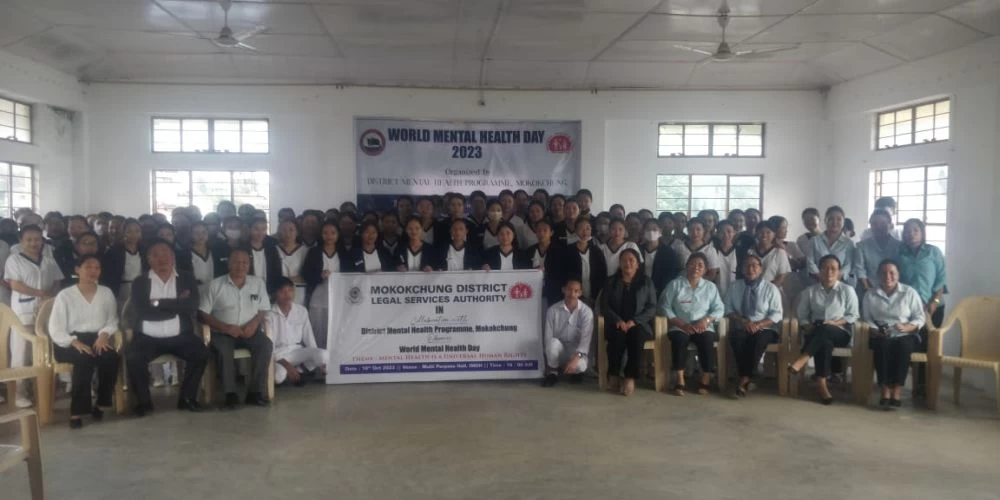
MOKOKCHUNG: District Mental Health Programme (DMPH), Mokokchung in collaboration with Mokokchung District Legal Service Authority (MDLSA) observed the day at multipurpose hall, IMDH
Dr Limanaro, DPO (NCD) said, “we observe this day in order to create awareness on mental health issues and to remove the stigma and misconception in mental illness.” She informed that health is not only about physical well being but also mental wellbeing and need to reduce the stigma surrounding mental health and encourage the participants to create awareness and sensitize people on mental health.
Theme elocution was delivered by MDLSA and welcome note was delivered by Vice Principal, School of Nursing IMDH. The programme was attended by Dr Kibangkumba CMO, School of Nursing, MDLSA and IEC staff.
WOKHA: District Mental Health Programme (DMHP) Wokha observed the day at Dr Motsuo Memorial District Hospital, Wokha. Dr Asunu Thong, Consultant, DH Wokha said “mental health involves everyone and emphasised on disseminating information on mental health among family, friends and colleagues.”
Dr Zubenthung Kikon, Chief Medical Officer, Wokha highlighted on increasing number of patients in the district hospital. “The mental healthcare services available in our facility should be made known to the public,” he informed. He suggested the need to sensitise the medical staffs on mental health inorder to enhance their efficiency and consistency in health services. “Addressing mental health issues at an early stage can prevent significant challenges in future,” he added.
Speaking on the theme, Dr Chikhrozho Kezo, Consultant Psychiatrist and Nodal Officer DMHP Wokha said the public should have knowledge of rights under the law related to mental health. It is imperative to have a good mental health and the post COVID stress is an eye opener for mental illness.
Short speech was delivered by Dr Rupert Peseyie, State Programme Officer, National Mental Health Programme on the Mental Healthcare Act and Tele Manas. He emphasised on the goals of Tele Manas to provide affordable and accessible mental health care. He gave a practical demonstration on the digital services provided by Tele Manas. More information on Tele Manas was provided by Likali Achum, Technical Coordinator, Tele Manas.
Shanchobeni P Lotha, Panel Lawyer, Wokha District Legal Services Authority briefed the participants on Mental Healthcare Act 2017. A brief report on DMHP Wokha status statistics was presented by Lireni Tungoe, Psychiatric Nurse.
.webp)
MON: District Mental Health Programme (DHMP) Mon marked the day with a walkathon from helipad to local ground which was flagged off by L Mongo, SDO (C) Mon.
Later, an event was held at DRDA hall to provide an opportunity for all stakeholders working on mental health issues to talk about their experiences, and what more needs to be done to make mental health care a reality for the people.
Dr Vezokholu Theyo, Chief Medical Officer, Mon, stated that health is a condition of total physical, mental, social, and spiritual well-being, not only the absence of disease. “Any form of mental disease may be treated and that everyone has the right to be treated,’ she said.
District Legal Service Authority, Retainer Lawyer, Mon Topha Angyen lectured about how mental health is universal human right in legal terms, with specifics on how to protect it.
Loungnyem Konyak, Psychiatric Social Worker, DMHP educated the mass gatherings on the initiatives undertaken by the DHMP Mon, the experiences and the issues the section faces, the majority of which concerns the programme’s insignificance by the community. He pleaded and asked the audience to help raise awareness about mental health and that the DMHP Mon is always ready to assist if needed.
.webp)
ZUNHEBOTO: District Mental Health Programme (DMHP) Zunheboto organised a programme at District Hospital Zunheboto.
Viketoulie Metha, EAC Zunheboto, theme speaker addressed the issues on mental health and illness which comes in form of anxiety disorder, eating disorder and mood disorder. He stressed on the statement “health is wealth” appertaining to both physically and mentally fit of a well-being.
“Mental health still remains insignificant due to the stigma associated with it in the society,” he stated and urged the participants to not backlash or criticize those who undergo mental issues but instead show empathy and concern and assist necessary support to successfully cope up with their illness.
He encouraged the nurses in the hospital to act as counsellors while dealing with the patients. He concluded by stating that to remove the discrimination, stigmatisation and misconceptions of mental health the society should intervene in creating awareness and educating the masses about various mental disorders.
Atolimi I Khujumi, Clinical Psychologist, highlighted on DMHP. She stated that the physical, mental, spiritual and social well-being of a person comprises to a healthy life. The recent use of smartphone and social media affects the mental health of an increasing number of adolescents and young people resulting in low self esteem and lack of self confidence, she added.
She stressed on the importance of mental health and encouraged the participants to create awareness to reach out to Tele Manas cell which caters to 24/7 free tele-mental health calls service available in different dialects to those with mental health problems/illness to get the right kind of help.
Inolito K Sumi, Panel Lawyer, Zunheboto DLSA highlighted on the Mental HealthCare Act, 2017.
During the programme, Sevikhonu Tsukru CHO Littami HWC, Imlijungla CHO Shitsumi HWC, Mughavili V Chishi CHO Chishilimi HWC, Moajungla Nurse OST centre DH, Toli S Zhimo OST Centre counsellor DH and Kinoli A Muru OST Centre counsellor Satakha PHC were felicitated with certificate and cash award for their outstanding performance and contribution to public with special focus on mental health.
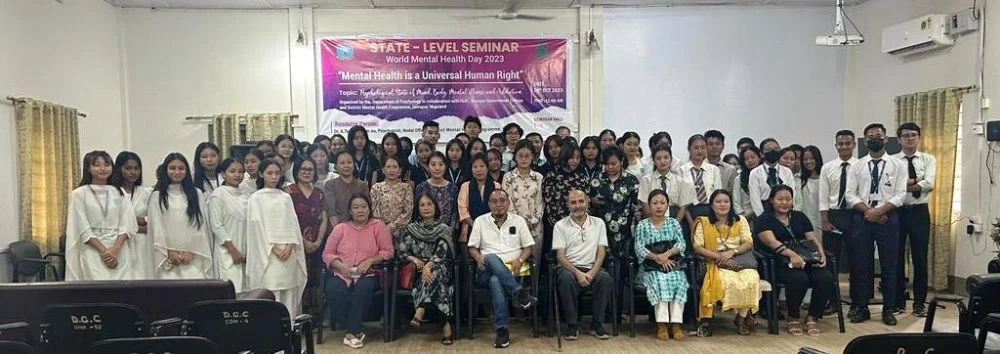
DIMAPUR: In commemoration of World Mental Health Day, a state-level seminar was held on the topic ‘psychological state of mind, body, mental illness, and addiction’ at Dimapur Government College.
The seminar was organised by Department of Psychology in collaboration with IQAC Dimapur Government College and District Mental Health Programme (DMHP), Dimapur.
Resource person Dr A Temsuyanger Ao, Psychiatrist, District Hospital Dimapur and Nodal Officer of DMHP Dimapur, gave a presentation on the relationship between our psychological state of mind and our body. He stated that our mind impacts our body and vice versa.
He presented various examples to show the connection between our mind and our body; such as a sudden shock or fear, which is the psychological mind, causes palpitation in our hearts, which is our body. He stated that our mind and body is closely related and cannot be separated. He, however, lamented that we usually ignore subtle signs of mental health issues but rushes to hospitals with the slightest physical injury to our body.
Dr Ao further sensitised the participants on normal and abnormal psychological symptoms. He stated that ups and downs in our psychological mind is also part of our lives such as exam tension, tension to perform well, etc which are positive symptoms as they make us work harder, however some symptoms can become very severe which may requires clinical help. He also briefly stated the types and causes of mental illness. He stated that our environment and upbringing also plays an important role in initiating mental disorders.
The programme was chaired by Dr Rukuoviu, Asst Professor, Department of Psychology, DGC. A short speech was also delivered by Prof Sanjay Sharma, Principal, DGC and vote of thanks delivered by P Supong Jamir, Asst Professor, Dept of History, DGC. The seminar was attended by participants from Dimapur Govt College, Unity College, St Joseph University, Tetso College, and Immanuel College.
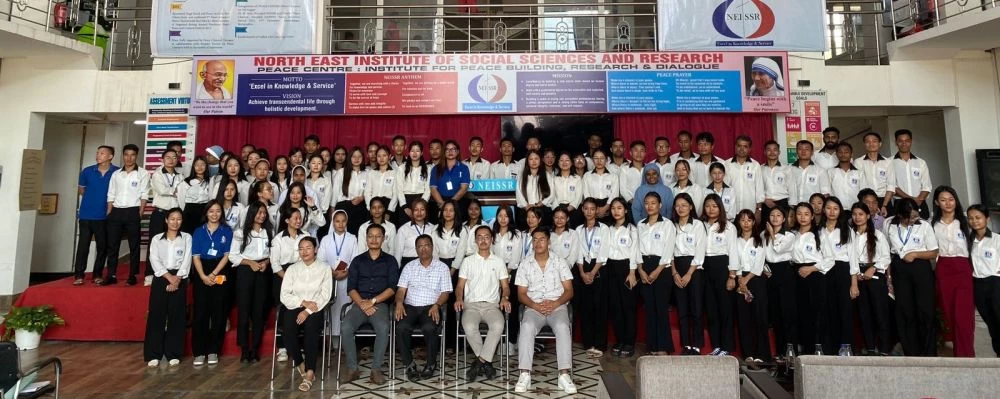
NEISSR: North East Institute of Social Sciences and Research (NEISSR), Chümoukedima with Carl Rogers Institute of Mental Health and School Counseling (CRIMHSC), Kohima commemorated the day at Peace Centre, Chümoukedima.
The resource person Daewon Nongmen of CRIMHSC underscored the universal nature of mental health challenges, stating, “Mental health crisis does not discriminate. It can happen to anyone.” He emphasised that mental health issues affect individuals of all ages, genders, and ethnicities and urged everyone to openly discuss their struggles without fear of judgment.
Nongmen highlighted the crucial role played by social workers in providing mental health support and awareness in society. He urged social workers to actively spread awareness about mental health issues, emphasising that effective listening and empathy are essential in assisting those in need. “Don’t listen to answer but listen to listen,” he advised, stressing that mental health is as vital as physical health.
Vivoto Koso of CRIMHSC called upon social workers to become advocates for mental health, emphasizing that wealth cannot cure mental health issues, but reaching out to others can make a significant difference in someone’s life.
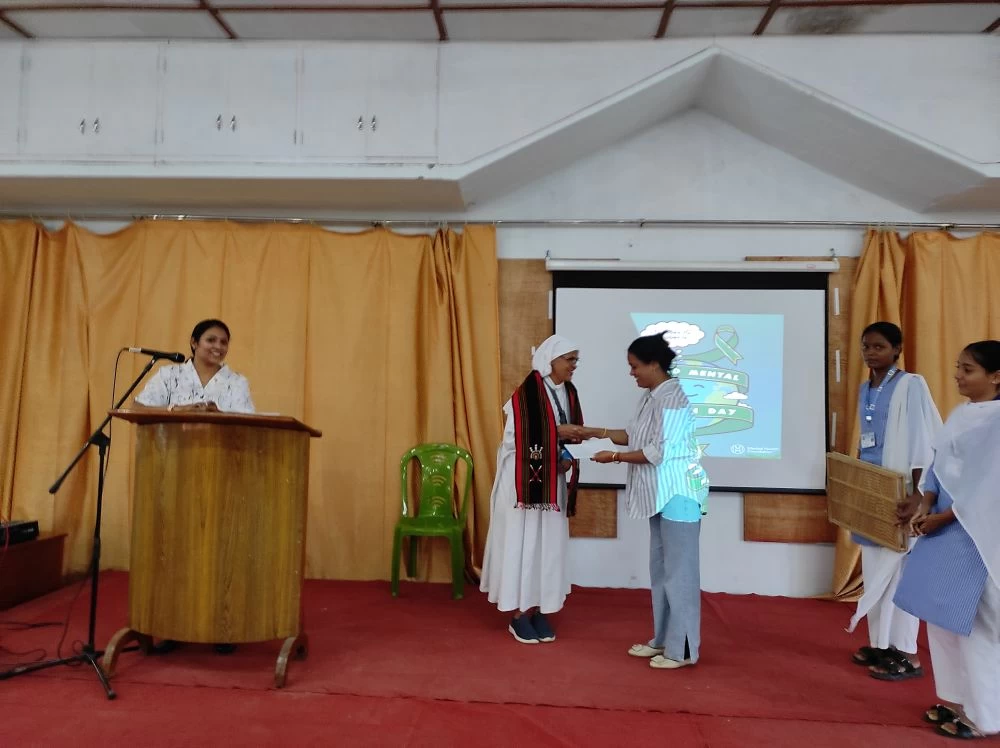
MGM College: MGM College, Department of Education marked the occasion by organising a guest lecture on the theme. The event’s highlight was an inspiring speech by Sr Divya from Medical Sisters of St Joseph (MSJ) congregation.
Sr Divya emphasised the importance of recognising mental health as a universal right. Drawing from her experience, she explored the various factors contributing to mental health deterioration, such as stress, societal pressure, and stigma. She spoke about creating awareness and ensuring everyone’s access to mental health resources, identifying signs and symptoms of mental health illness. She shared insightful anecdotes and personal experiences to illustrate the challenges individuals face when struggling with mental health issues, creating mental health awareness, coping mechanisms, and available resources, providing invaluable insights into managing mental well-being.
SJC Jakhama: World Mental Health Day was observed in St Joseph’s College (Autonomous), Jakhama by Counselling Psychology students.
In her short speech, Abeinuo spoke on the state of mental well-being that enables people to cope with the stresses of life, realize their abilities, learn well and work well, and contribute to their community. She further said that it is an integral component of health and well-being that underpins our individual and collective abilities to make decisions, build relationships and shape the world we live in. In conclusion, the speaker said that mental health is a basic human right and it is crucial to personal, community and socio-economic development.
Sr Anupa and Fr C Joseph, counsellors of the College spoke on the importance of mental health for living a stable and healthy life.
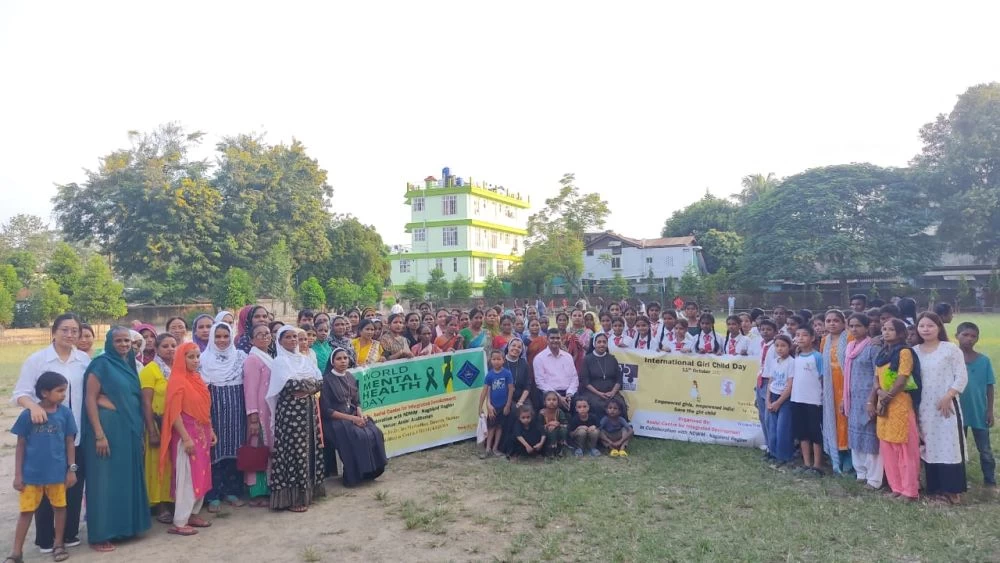
NDWM-Nagaland Region: The NDWM-Nagaland Region in collaboration with Assisi Centre for Integrated Development (ACID) commemorated World Mental Health Day and International Girl Child Day in anticipation in Assisi Auditorium on October 10.
The speaker, Rev Fr Dr Joe Mariadhas, Director, Shalom Rehabilitation Centre Chümoukedima, focused much on gender (women) and mental health. He observed that “mental health like physical health is clearly gendered. Men and women have different patterns of mental illness and other forms of mental distress and they are exposed to different risk factors and vulnerabilities. A number of different theories have been proposed for gender differences in the prevalence of mental health problems.”
He said due to the role of a woman in society, she is often higher target for mental health condition. Depression, anxiety, stress and also insomnia are common mental illnesses with women.
He cautioned the participants stating, “If you find with yourself sleeping more or less than usual, feeling out of control, feeling worthless, hopeless or empty, difficulty in concentrating, mood swings like sudden happiness or sadness, feeling disoriented or unable to enjoy things that usually being pleasure, increased or decreased appetite.”
“You better speak up and get treated. As our physical health is important, mental health is as important, if we have good physical health it contributes for the better mental health,” he added.
In the second session, Sr Vanitha spoke on girl child and the family. Every year October 11 is commemorated International Girl Child Day. The programme was attended by 210 members.


